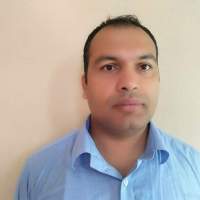- Forum
- categories
- Announcements and miscellaneous
- New publications (books, articles, websites, videos)
- Call for paper - Waterlines (a general and open-ended call for papers) - Planning and resourcing WASH services
Call for paper - Waterlines (a general and open-ended call for papers) - Planning and resourcing WASH services
8063 views
- Pravin
-

- Expertise in WASH; specialist on WASH Governance, WASH Systems Strengthening. Experienced on WASH project implementation, monitoring, evaluation and learning. Experienced on emergency response, recovery and development programs. Previous experiences on operational safety with procurement and logistics management.
Less- Posts: 1
- Likes received: 0
Re: Call for paper - Waterlines (a general and open-ended call for papers) - Planning and resourcing WASH services
Hi Jona, I am curious to read the discussion paper on WASH and Health. With the experience of strengthening WASH systems and SSI, there might come views with the insights of this discussion paper and will be happy to share with you and the forum. Pravin
Please Log in to join the conversation.
You need to login to reply- Jona
-
 Less
Less- Posts: 61
- Karma: 3
- Likes received: 17
Re: Call for paper - Waterlines (a general and open-ended call for papers) - Planning and resourcing WASH services
The discussion paper "WASH & Health" has been moved. You can find it under the following link:
forum.susana.org/26-health-issues-and-co...in-times-of-covid-19
Happy reading,
Jona
forum.susana.org/26-health-issues-and-co...in-times-of-covid-19
Happy reading,
Jona
Business Development Manager
LAVESE - aquanesa solution
LAVESE - aquanesa solution
Please Log in to join the conversation.
You need to login to reply- Jona
-
 Less
Less- Posts: 61
- Karma: 3
- Likes received: 17
Re: Call for paper - Waterlines (a general and open-ended call for papers) - Planning and resourcing WASH services
Dear Paul,
Thanks for your explanation, it's very helpful.
It struck me that zoonoses (diseases caused by pathogens, that can are transmitted from animals to human beings) are so often the origin of infectious diseases. We need to take a much closer at the impact of our WASH interventions. The call for transformative WASH cannot be loud enough.
The One Health approach is a holistic concept of health at the human-animal-ecosystem interface. It involves zoonotic diseases, antimicrobial resistance due to increated (prophylactic) treatment with antibiotics of animals and plants, which makes effective treatment for humans much more difficult. Other common issues in One Health are food safety and food security, vector-borne diseases, environmental contamination, but it can also include chronic diseases, mental health, injury, occupational health and non-communicable diseases (read more on the CDC website: www.cdc.gov/onehealth/basics/ ).
Even though, there is such a great potential in One Health (WASH is deeply anchored in the approach), it does not yet seem to be a well known concept in the WASH community. Thanks for pointing this out, Elisabeth.
Health is one of the important long-term achievements of successful WASH interventions. Speaking the SDG-language: While the outcomes (number of beneficiaries, who have access) is measured in "our" SDG 6, most impacts for better life of individuals and societies reveal only after time and are measured e.g. in SDG 3.9 in the indicator "Mortality rate attributed to unsafe water, unsafe sanitation and lack of hygiene (exposure to unsafe WASH services)".
The discussion paper on WASH and Health is in the final stage. It is primarily for SuSanA partners and members inviting them to a trip to the health sector, meeting other actors, learning new terms and concepts. One Health is one of them. It also provides a common ground and shows some entry points for dialogue and possible cooperation between WASH and Health.
You might find 100 papers on One Health in your inbox in a few weeks time
Best,
Jona
Thanks for your explanation, it's very helpful.
It struck me that zoonoses (diseases caused by pathogens, that can are transmitted from animals to human beings) are so often the origin of infectious diseases. We need to take a much closer at the impact of our WASH interventions. The call for transformative WASH cannot be loud enough.
The One Health approach is a holistic concept of health at the human-animal-ecosystem interface. It involves zoonotic diseases, antimicrobial resistance due to increated (prophylactic) treatment with antibiotics of animals and plants, which makes effective treatment for humans much more difficult. Other common issues in One Health are food safety and food security, vector-borne diseases, environmental contamination, but it can also include chronic diseases, mental health, injury, occupational health and non-communicable diseases (read more on the CDC website: www.cdc.gov/onehealth/basics/ ).
Even though, there is such a great potential in One Health (WASH is deeply anchored in the approach), it does not yet seem to be a well known concept in the WASH community. Thanks for pointing this out, Elisabeth.
Health is one of the important long-term achievements of successful WASH interventions. Speaking the SDG-language: While the outcomes (number of beneficiaries, who have access) is measured in "our" SDG 6, most impacts for better life of individuals and societies reveal only after time and are measured e.g. in SDG 3.9 in the indicator "Mortality rate attributed to unsafe water, unsafe sanitation and lack of hygiene (exposure to unsafe WASH services)".
The discussion paper on WASH and Health is in the final stage. It is primarily for SuSanA partners and members inviting them to a trip to the health sector, meeting other actors, learning new terms and concepts. One Health is one of them. It also provides a common ground and shows some entry points for dialogue and possible cooperation between WASH and Health.
You might find 100 papers on One Health in your inbox in a few weeks time
Best,
Jona
Business Development Manager
LAVESE - aquanesa solution
LAVESE - aquanesa solution
Please Log in to join the conversation.
You need to login to reply- pthutch
-
 Topic AuthorLess
Topic AuthorLess- Posts: 3
- Likes received: 3
Re: Call for paper - Waterlines (a general and open-ended call for papers) - Planning and resourcing WASH services
Hi Jona,
Thanks for your message on this.
We issued a general open call for papers on topics which we believe were either continued intractable challenges, such as the sustainable resourcing of WASH services, and new topics that we believe are important to the topic, including reconsidering WASH through a One Health paradigm. In this sense, there was not a special issue planned on either of these but they were pointers to the types of topics we think papers should be written on.
I have to admit we haven't received any papers on One Health at Waterlines, at least since this call. There are many papers now discussing zoonotic pathogens and enteric infection in the global health literature and the calls for more "transformative WASH" approaches that provide more comprehensively hygienic living environments also highlight the importance of considering animal origin pathogens. I do think the science is now pointing in this direction but I am unsure what workable and contextually adapted WASH interventions look like and that would be a topic that Waterlines would be in a good place to cover.
I would be interested in reading your paper when you have finished it and you may even consider submitting it to Waterlines if you were interested. On this topic, we have a paper coming online tomorrow I think (?) in Plos One on campylobacter infection risk for infants from a study in rural Ethiopia. Sophie Budge, a PhD researcher, is the lead author - she may be an interesting person to talk to about this topic.
Please do get in touch if you'd like to know more, best wishes,
Paul
Thanks for your message on this.
We issued a general open call for papers on topics which we believe were either continued intractable challenges, such as the sustainable resourcing of WASH services, and new topics that we believe are important to the topic, including reconsidering WASH through a One Health paradigm. In this sense, there was not a special issue planned on either of these but they were pointers to the types of topics we think papers should be written on.
I have to admit we haven't received any papers on One Health at Waterlines, at least since this call. There are many papers now discussing zoonotic pathogens and enteric infection in the global health literature and the calls for more "transformative WASH" approaches that provide more comprehensively hygienic living environments also highlight the importance of considering animal origin pathogens. I do think the science is now pointing in this direction but I am unsure what workable and contextually adapted WASH interventions look like and that would be a topic that Waterlines would be in a good place to cover.
I would be interested in reading your paper when you have finished it and you may even consider submitting it to Waterlines if you were interested. On this topic, we have a paper coming online tomorrow I think (?) in Plos One on campylobacter infection risk for infants from a study in rural Ethiopia. Sophie Budge, a PhD researcher, is the lead author - she may be an interesting person to talk to about this topic.
Please do get in touch if you'd like to know more, best wishes,
Paul
Please Log in to join the conversation.
You need to login to reply- Elisabeth
-
- User is blocked
- Freelance consultant since 2012
Less- Posts: 3372
- Karma: 54
- Likes received: 932
Re: Call for paper - Waterlines (a general and open-ended call for papers) - Planning and resourcing WASH services, new development paradigms and WASH
Hi Jona,
I have sent Paul an e-mail to alert him to your question.
Your post was the first time I heard the term "One Health". Could you please elaborate more on what you are doing in that respect?
And how is the Wikipedia article on One Health? Is it any good, or if not can you help improve it?:
en.wikipedia.org/wiki/One_Health
Regards,
Elisabeth
I have sent Paul an e-mail to alert him to your question.
Your post was the first time I heard the term "One Health". Could you please elaborate more on what you are doing in that respect?
And how is the Wikipedia article on One Health? Is it any good, or if not can you help improve it?:
en.wikipedia.org/wiki/One_Health
Regards,
Elisabeth
Dr. Elisabeth von Muench
Freelance consultant on environmental and climate projects
Freelance consultant on environmental and climate projects
Please Log in to join the conversation.
You need to login to reply- Jona
-
 Less
Less- Posts: 61
- Karma: 3
- Likes received: 17
Re: Call for paper - Waterlines (a general and open-ended call for papers) - Planning and resourcing WASH services
Dear Dr Paul Hutchings & Professor Richard Carter,
I'm curious to hear about the status of the quetsions that you were working on for Waterlines. In particular, I'd be interested in answers to question 4 "How can truly hygienic environments and behaviours be achieved, and what does ‘one-health’ (human-animal-environmental interactions) mean
for practices and policies?" Maybe I have overlooked the publication of this?
I'm currently working on a discussion paper on health, in which key terms and approaches will be highlighted. One Health is one of them.
Best,
Jona
I'm curious to hear about the status of the quetsions that you were working on for Waterlines. In particular, I'd be interested in answers to question 4 "How can truly hygienic environments and behaviours be achieved, and what does ‘one-health’ (human-animal-environmental interactions) mean
for practices and policies?" Maybe I have overlooked the publication of this?
I'm currently working on a discussion paper on health, in which key terms and approaches will be highlighted. One Health is one of them.
Best,
Jona
Business Development Manager
LAVESE - aquanesa solution
LAVESE - aquanesa solution
Please Log in to join the conversation.
You need to login to reply- pthutch
-
 Topic AuthorLess
Topic AuthorLess- Posts: 3
- Likes received: 3
Call for paper - Waterlines (a general and open-ended call for papers) - Planning and resourcing WASH services
Apologies for any cross-posting
Dear all,
We are posting this topic as Co-Editors of Waterlines with a general and open-ended call for papers and to highlight a number of priority areas we’d be especially keen to receive papers on for future editions:
Planning and resourcing WASH services
1) How to strengthen and provide sufficient human and financial resources to local governments to enable them to support WaSH services in their jurisdictions - especially in countries with small tax bases and limited fiscal decentralisation?
2) How to raise the political priority of WASH to get it on a par with health, education, roads and energy – what arguments need to be made, to whom, and how? Is evidence enough to influence political change?
3) And how to get clear and committed agreement on who should invest in what aspects of WASH – Capex, Opex, Capmanex and direct and indirect support costs?
New development paradigms and WASH
4) How can truly hygienic environments and behaviours be achieved, and what does ‘one-health’ (human-animal-environmental interactions) mean for practices and policies?
5) How can we deliver WaSH that is climate resilient – what does this mean in practice, and how can practitioners integrate climate resilient strategies into their work?
In addition to these areas, we continue to accept papers from across the full spectrum of water supply, sanitation (including waste management) and hygiene issues that are of relevance to practitioners and researchers focused on low- and middle-income countries.
We’d also like to take this opportunity to remind you that we now accept papers in two formats including full research papers and shorter practice papers. More details are available on the website here:
practicalactionpublishing.org/waterlines...ructions-for-authors
Thank you for your continued support for Waterlines.
Best wishes,
Dr Paul Hutchings & Professor Richard Carter
Dr Paul Hutchings
Waterlines, Co-Editor – practicalactionpublishing.org/waterlines
Lecturer in Water, Sanitation and Hygiene (WaSH) Impact Evaluation
Cranfield University | E: This email address is being protected from spambots. You need JavaScript enabled to view it.
Dear all,
We are posting this topic as Co-Editors of Waterlines with a general and open-ended call for papers and to highlight a number of priority areas we’d be especially keen to receive papers on for future editions:
Planning and resourcing WASH services
1) How to strengthen and provide sufficient human and financial resources to local governments to enable them to support WaSH services in their jurisdictions - especially in countries with small tax bases and limited fiscal decentralisation?
2) How to raise the political priority of WASH to get it on a par with health, education, roads and energy – what arguments need to be made, to whom, and how? Is evidence enough to influence political change?
3) And how to get clear and committed agreement on who should invest in what aspects of WASH – Capex, Opex, Capmanex and direct and indirect support costs?
New development paradigms and WASH
4) How can truly hygienic environments and behaviours be achieved, and what does ‘one-health’ (human-animal-environmental interactions) mean for practices and policies?
5) How can we deliver WaSH that is climate resilient – what does this mean in practice, and how can practitioners integrate climate resilient strategies into their work?
In addition to these areas, we continue to accept papers from across the full spectrum of water supply, sanitation (including waste management) and hygiene issues that are of relevance to practitioners and researchers focused on low- and middle-income countries.
We’d also like to take this opportunity to remind you that we now accept papers in two formats including full research papers and shorter practice papers. More details are available on the website here:
practicalactionpublishing.org/waterlines...ructions-for-authors
Thank you for your continued support for Waterlines.
Best wishes,
Dr Paul Hutchings & Professor Richard Carter
Dr Paul Hutchings
Waterlines, Co-Editor – practicalactionpublishing.org/waterlines
Lecturer in Water, Sanitation and Hygiene (WaSH) Impact Evaluation
Cranfield University | E: This email address is being protected from spambots. You need JavaScript enabled to view it.
The following user(s) like this post: Jona
Please Log in to join the conversation.
You need to login to reply
Share this thread:
- Forum
- categories
- Announcements and miscellaneous
- New publications (books, articles, websites, videos)
- Call for paper - Waterlines (a general and open-ended call for papers) - Planning and resourcing WASH services
Recently active users. Who else has been active?
Time to create page: 0.193 seconds







